Text
ENTP: Sometimes I get completely absorbed by an idea when I'm trying to understand something. Depending on the idea, it could last a whole day or even weeks, lol. How do you differentiate between Se inferior and Se demon, and Si inferior and Si demon? For example, I tend to forget my keys, dates, and things like that. Are these examples of Si inferior?
Rob: When it comes to the inferior function, you can't control it—it controls you. Often, doing anything outside of its demands feels meaningless or like venturing into dangerous territory.
In your example, Si has taken over your mind, directing you to focus on understanding something. You can't do anything else until you grasp the idea well enough. Si focuses intensely on one thing at a time. You might obsess over a book but forget about your keys and other basic stuff.
Si inferior is like "god" against Se demon. Si wants to be prepared instead of diving into situations unprepared. It seeks to see the concrete patterns that encompass all possibilities so you have a clear idea moving forward. A developed Si gives Ne users the improvisational skills they’re known for.
Se, on the other hand, is very focused on making one specific thing happen exactly as Ni envisioned. It's about hammering through until it fits, or trying and failing until success is achieved. If Se users want to avoid constant failure, they need to be deeply in tune with the present moment, to which they do and are known for. They figure things out on the spot.
Si doesn't believe in this linear approach. It prefers to be prepared for the unknown and knows how to navigate around obstacles, which is why Se is "demonized." You don't want life to be linear but need a consistent approach that accommodates the many ways reality can manifest.
That's what makes humans interesting! We follow patterns but also contradict ourselves. Ne-doms might seem like they're winging it, but they're not entirely—they're improvising with a sense of underlying structure. For many it's not just having a clear understanding, but also having gone through a lot of experience.
3 notes
·
View notes
Text
ENTP: I look at different aspects that could be linked to a situation or perhaps how it would evolve. But I wouldn’t be convinced that “it could be this or could be that, what if this or what if that, what about if this is something else.” I like to speculate on the results, except when it comes to my personal stuff like money and health. For these, I wouldn’t speculate and would prefer something stable.
I notice that I would suggest completely unorthodox or even radical solutions to other people's problems or situations, but I don’t know if I would follow my own advice in some aspects lol
————
Rob: Now *how* you approach problems, like educating, laying information out in a clear way, “what if this what if that,” suggesting radical solutions are all SiTi. So if NeFe is your skillset, SiTi is your set of instructions for how to build that harmony or that experience for others and yourself.
Si is a concrete proactive lens, it wants to see things clearly. All of the questions you ask are all essentially "Instructions unclear, can you clarify this..." There needs to be that a-ha! dot-connecting moment in your brain to get that little dopamine your Si needs. And it's a microscope, so it wants to see all of the little details and seek many perspectives even if they're a tiny bit different from each other. That proactivity is what allows you to be a step ahead.
Some ENTP have such a strong SiTi, they always have that thirst to be the one who understands the situation more than everyone else. And it's thanks to going over every a little Si angle that allows you to get into a situation without exactly knowing how something will happen (Se) but at least you have an general idea (Ne) and you wouldn't be exactly surprised. Like we never really know how a new baby born will look like, but we got an idea based on how the parents looks like. It'd be a crazy surprise if the baby didn't look like them lol
The thing about SiTi is that it's still theoretical. So yes, the math checks out, but you might've never seen it happen before. And that can be unorthodox, and it's maybe more of a suggestion then advice. But Si is curious enough to see it happen anyway.
That curious thirst can feel out of your control though, sometimes you'd be so curious and it latches onto your mind that that's the only thing you think about, and then next day it can be totally gone, or it wants you to be curious about something else.
15 notes
·
View notes
Text
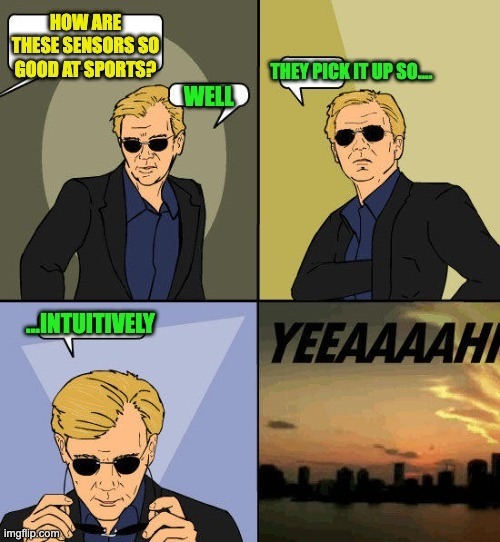
4 notes
·
View notes
Text
Here’s the old one:
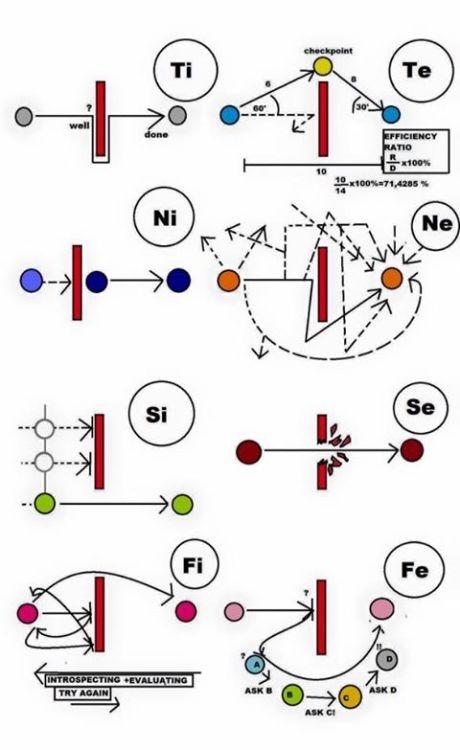
Now here’s the fixed one:
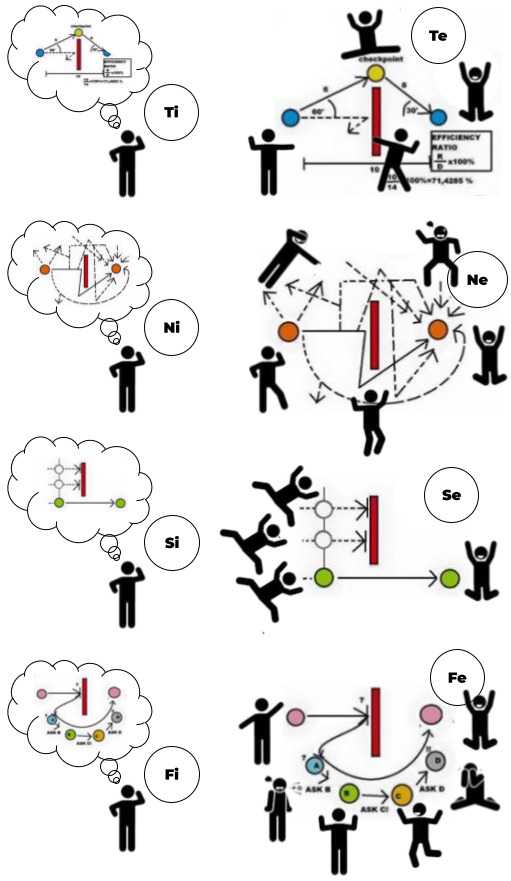
Now allow the functions working together in a type.
What would be in an INTP's mind with TiSi, how do they get the foresight to get to the other side in one shot? Is FeNe like getting people to buy in?
What about an ENTJ? How do they figure in hindsight so they'll get it one shot next time? What are they asking themselves with FiNi?
#intp memes#entj memes#cognitive functions#introverted intuition#introverted sensing#introverted thinking#extroverted thinking#extroverted sensing#extroverted intuition#entj#mbti#intj#estj#isfp#istj
19 notes
·
View notes
Text
Q: Is there an #INTJ subtype of the #ISFP (Convergent perhaps?)? What could this INTJ-ish ISFP act like as opposed to other ISFPs?
A: Yeah, it's very possible for the ego to live in between INTJ-ISFP. Indeed a convergent subtype ISFP would be like this, so is a convergent subtype INTJ btw! Now a default ISFP lives somewhere in the mix of ISFP-ENTJ, ISFP-ESFJ, ISFP-INTP.
Compare that to the INTJ subtype, you can see how the default ISFP would be a bit more extroverted cerebral and goal oriented, a bit more of a mentor from their ESFJ side, a bit more conscientious from the ENTJ side. And their INTP side would give them a more logical and process oriented side.
A subtype is someone who spends much of their energy leaning on another type beside their dominant. So all of the sides mentioned about the default ISFP would be subdued in favor of a more awakened INTJ side. This subtype ISFP would much more introverted, more in comfortable with existential and spiritual topics.
1 note
·
View note
Text
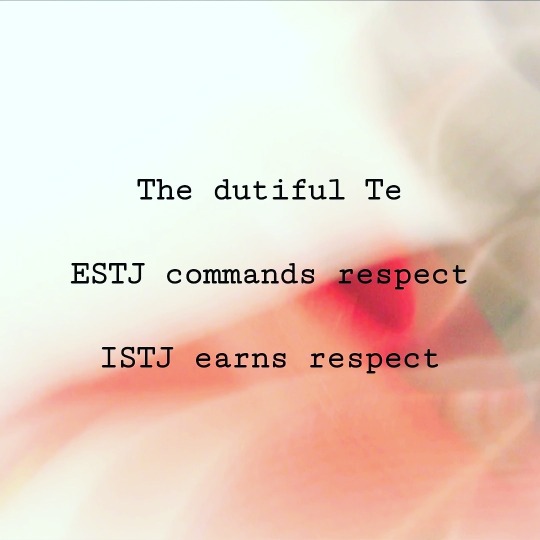
2 notes
·
View notes
Text
The truth bearing of Fe dominant
Remember this about functions: If you lead by the dominant function, you are led by the inferior function.
ENFJs and ESFJs are driven by their Introverted Thinking (Ti), and they use Extraverted Feeling (Fe) as the means to express Ti. That makes them logically driven people. This is different from other Fe's of other types. They interact with the world via Fe based on their Ti laws and principles. They seek the truth, live by the truth, promote the truth. They can live so logically and objectively they're willing to ignore their own feelings and opinions. They see feedback from others are more objective (read more valuable).
We've always heard how Ti is like having this one single truth or theory of everything. Ti-domimants like to build and model their own, Fe-dominants promote it. Truth sets people free, the world is better off if we understand more about it. They can even be evangelical about that. Harmony is when everyone's unified by that one Ti truth—for everyone to agree on something and fall in line.
The typical descriptions of ENFJs and ESFJs are sensing other people's emotions. But again, Fe is just the means to promote Ti. Many of us picture them as social people pleasers when they’re actually ego managers enforcing logical rules and convincing others to follow them. So one way to reword that is typically ENFJs and ESFJs have learned to be good with people and emotions in order to find sensible ways to instill truth in people. Fe is the utility and creativity to inform emotional human beings.
A practical example is being a teacher teaching math in grade school. Arithmetic is irrefutable truth in the practical sense, and we're better off knowing about it. Some of us might *feel* discouraged when we don't get it, and the Fe-dominant teacher can help us sort our feelings around and help us better intake the information.
But it’s not like Fe-dominants figured everything out nor have the necessary knowledge to make themselves useful in the first place. They study. A lot. That’s what Ti Oppositional means—To proactively research and acquire knowledge for Fe to shape the world. The best teachers make the best students. Learn to follow before you lead. More than any other type, Fe-dominants put a lot of pressure on themselves to ensure they’re in the position of knowing what they’re doing. If they were insecure about one thing, it’d be losing that credibility. There’s motivation to go beyond competence, and be the embodiment of excellence.
Competence is meeting performance expectations, excellence is putting a face on it.
So that introduces many ways an Fe-dominant can be:
The more extraverted ones can get into more combative situations where people may not agree with their Ti. They'll try to hammer in and talk some logical sense into them.
The more introverted ones are rather private with what they believe in, they might see Ti as principles to live by on a personal level. And would only share their thoughts if those around are willing to listen.
The more anxious ones feel like they believe in something that people might disagree on and might get volatile about, so they keep it to themselves.
The more agreeable ones tend to operate safely with information that everyone already agrees with. Everyone likes humor, everyone likes music for example.
There are infinitely more, these are just what I can come with. Just remember that there's a catch with Ti, in that it's actually quite subjective. But ENFJs and ESFJs can get too caught up with it thinking it's objective and that people should look at it as such.
10 notes
·
View notes
Text
“I have a problem when we measure ourselves, when we measure the importance of our lives by the careers we've had. I have a problem with that for many reasons. It suggests that we are measured by what we do in our lives, by the occupations we have, where in reality we should be measured by the impact we have, the intensity impacts we have on people.
I made a promise to myself that I will spend the rest of my life doing everything I humanly can: to do good, to make tomorrow better than today, to make the world a better place. I know it's a super cliché thing to say but it is absolutely true. And I certainly hope that I am not measured by any job I've ever had now, in the past, or in the future, because I know I'm not done.
The more important thing is the impacts we leave on people, on our friends, on our family. And that they are then inspired to be a better human being to the next person. I think that's what we should be measured by and we just don't do it enough.”
–ISFP
#mbti#myers briggs#cognitive functions#personality types#16 personality types#isfp personality#isfp#introverted intuition#introverted feeling#extroverted sensing#extroverted thinking
5 notes
·
View notes
Text
The most Te tertiary thing to say:
“Many of you have informed me that I actually didn't go camping; I went *glamping*. But last I checked, glamping is a portmanteau of 'glamorous camping'. And that has the word 'camping' in it. So if you think strawberry ice cream is still ice cream, iced coffee is still coffee, and york university is still a university, then I went camping.”
2 notes
·
View notes
Text
"When you want to help people, you tell them the truth" INFJ/ISFJ: Well yeah if it's obvious. But it's not like we know it right away. It takes time to uncover it, if it even exists. Hold your horses until then...
#mbti#myers briggs#cognitive functions#16 personality types#infj#isfj#extroverted feeling#introverted thinking
6 notes
·
View notes
Text
The inferior function can be stronger than the dominant function
You may have heard how the inf fx (opp) can become more powerful than if it was dominant. ie, INFPs can be "more" ESTJ than regular ESTJs. Jung would say it's a way to compensate, balancing being Fi-dom with bursts of Te.
With Te as their anchor, INFPs are objective logic *based* types sorting subjectivity from objectivity. But how can their Te be "more" Te than ESTJs? Our opp comes out whenever it wants. And if we neglect it, it'll grow nasty, rebel, and rule over our ego. That's how we project.
Using our emotions, it gets the best of us. To better control this, we check with our opp. The majority of us do. ESTJs rarely do anything that goes against Fi. Therefore Te isn't purely objective, it's driven to meet Fi's standards.
When INFPs go into "ESTJ" mode, their Te isn't as Fi influenced like ESTJs. It's more objective. Many INFPs promote embracing the cold truth. Reality just is. We need to understand it using a pure logical mindset so we can be best informed when we're sorting our feelings about it.
Their Fi is influenced by Te, not the other way around. Unlike ESTJs, INFPs don't worry about their Fi. They're Fi-doms! They're in tune with it all the time, at no point it's at risk to project. They can afford to detach with Fi from time to time.
#mbti#myers briggs#cognitive functions#personality types#16 personality types#introverted feeling#extroverted thinking#infp#estj#fi#te
15 notes
·
View notes
Text
No other types learns and improves faster than the ESFP. And that’s not restricted only to sports, but in anything they put their mind into

#mbti#myers briggs#cognitive functions#personality types#16 personality types#esfp#extroverted sensing
2 notes
·
View notes
Text
“Each and everyone of us has arrived here fully equipped with a unique manifestation of consciousness, a divine spark all your own patiently waiting discovery. I choose to believe we are here to evolve. It is our purpose to become who we truly are, not who we are convinced society requires us to be, but to instead step into our most authentic, self-actualized selves where there is no daylight between who we are and who we aspire to become. Because *you* are the one you've been waiting for. Because the world needs the best version of you. And because the clock is ticking.” –INTJ
#mbti#myers briggs#cognitive functions#personality types#16 personality types#intj#introverted intuition#introverted feeling#extroverted sensing
37 notes
·
View notes
Text
When INTJs/ISTJs feel totally outclassed


#mbti#myers briggs#cognitive functions#personality types#16 personality types#intj#istj#introverted feeling
5 notes
·
View notes
Text
A client asked what's the most common/rare type. Here are my 2 cents: Firstly, I acknowledge my life could attract higher concentrations of certain types. I live in a bubble, work in a certain industry, have hobbies like working on cars, play sports, go to clubs and festivals...

So in MY experience, people most commonly fall around ENFP. INFJ is what I see the least common, which is interesting considering ambiversion. So the sum of the least and most common type fall in between ENFP/INFJ spectrum.
But INFJs aren't that rare by a long shot.
If 2% of people are INFJs, that's ~4% less than ~6% avg (100/16) if types are evenly distributed. That 4% would be spread across the board. But to make the most extreme case, let's add all 4% to ENFP raising it to 10% pop. So 1 of 10 people are ENFPs. That's far from majority.
I'm good friends with lots of ENFPs. Each of them are unique in their own way. Many of them know and compliment each other despite being the same type. All INFJs are staunch individualists with their own views who don't mind disagreeing with others. Truth is more important...
But I'm sure each of their unique perspectives have a lot in common. Truth is common!
No matter what we are, we're all unique. We're special and common at the same time. We get so hung up because we're afraid, refuse to believe we're really alone, and shame the weirdness away.
Or we feel victimized, lead with an inferiority complex, and use being misunderstood as currency of self-worth. Both respond to society, one is with, the other is against. That's OK, it's natural. Growing up, society shapes our individuality. There's no light without dark.
So then how do we know if what we want is what society made us want? It shows in the way we've let our egos define who we are. Who wants to be validated, virtuous, and in control?
When we become so type fluid, whatever type our ego wants to identify with will cease to matter.
#mbti#myers briggs#cognitive functions#personality types#jungian#16 personality types#carl jung#enfp#infj#introverted intuition#extroverted intuition
4 notes
·
View notes
Text
The Shadow is a product of us-vs-them thinking. Cognitive functions are just another category of this like Apple v Samsung, Left v Right, Edward v Jacob, Feelers v Thinkers, etc... Often described as some source of evil, the existence of the Shadow isn't actually a bad thing.
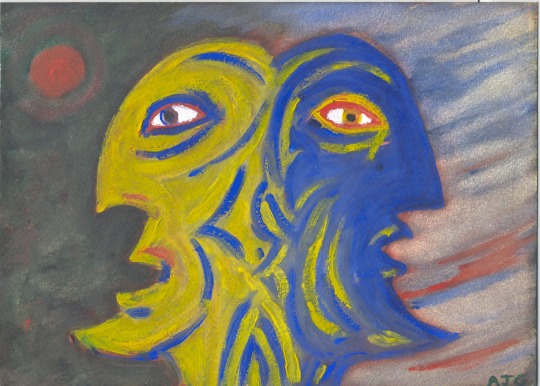
Everybody under the sun has a Shadow. Everybody projects, and projection in itself isn't bad either. We unconsciously project positive qualities too. What matters is our *relationship* with our Shadow.
The advice is to look inward for what we don't like about ourselves... But maybe a more effective way is to look around us. Let's find what we project; what makes us defensive; what makes us justified to shame; what gets us sensitively triggered?
We treat people the same way we treat ourselves. And we treat those who are different than us the same way we treat our Shadow.
We're whole human beings. We use all cognitive functions, most of them unconsciously ruled by the conscious minority.
Our wellbeing depends on how our egos, the rulers of our psyche, treat the "inferior" parts of ourselves. If they've been inhumanly neglected, they'll revolt.
Personally I see my past self as my Shadow, a self that I no longer relate but love nonetheless.
youtube
#mbti#myers briggs#cognitive functions#personality types#jungian#16 personality types#carl jung#shadow work#light and shadow#Youtube
6 notes
·
View notes
Text
Moreover because we're so used to being misunderstood, we got into a habit of figuring others out.
That's great and all, but we get too quick on shoving people into these neat little boxes and judge them. Then we get defensive when we get called out for it. The hypocrisy!
Some people joined typology communities because they felt misunderstood and looked for refuge that validated who they are.
Once they found they're one of the revered types, they became like the same supremacists who misunderstood them in the first place
They simply fitted into a system alternative to mainstream. Anybody else that didn't fit or accused of mistyping got gaslit against the system in the same way they got gaslit in the mainstream.
They were judged by their quirks, now they judge others by type. How's that better?
Any slight of accusation of mistyping would brake whatever fragile reality they have. A reality based on a system that's not even falsifiable, let alone true.
A deprived ego is no different than a boosted one. Both breed the same kind of toxic. Both can't deal being questioned.
youtube
20 notes
·
View notes